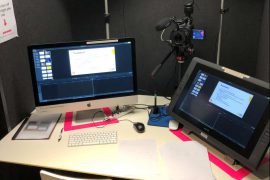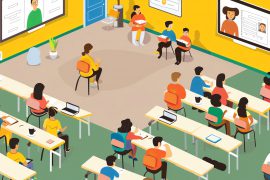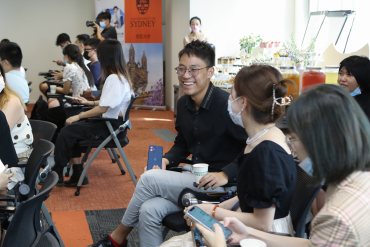Part 2 -MCQs can help reactivate previously known information.
We saw in part 1 how retrieval practice, including through practice MCQ testing, helps students to reinforce learning. Other studies show how MCQs can help reactivate previously known information that cannot currently be recalled.
It’s on the tip of my tongue…
How much information can the human memory hold? Studies show it is virtually unlimited; using one cognitive model, it was estimated as the equivalent of 108432 bits. Sadly though, much of this information won’t be accessible at a given time; knowledge that is not available at a particular time is referred to as marginal knowledge. When the answer is on the tip of your tongue, you are trying (and failing!) to access marginal knowledge. Often the answer will suddenly come to you at a later time – your attempt to access it (retrieval practice) has triggered stabilisation.
Can we use this to help students?
Marginal knowledge fluctuates. That is, knowledge that has become unavailable can be reactivated by attempting to retrieve it, including through a multiple-choice question, as a group of psychology and neuroscience researchers demonstrated. They showed how multiple-choice tests – even without feedback – can help students access and retain access to marginal knowledge.
In a series of experiments learners were tested on real and fictitious general knowledge; logically, marginal knowledge could only exist for the real general knowledge, so exposure to fictitious general knowledge could only create new knowledge. The findings were that MCQs could help students retrieve knowledge that had become marginal.
…multiple-choice testing and re-exposure were equally effective strategies for stabilizing access to marginal knowledge. … the results highlight how relatively simple it is to reactivate knowledge.
(Cantor et al, 2015)
The effect was found to be robust over 48 hours. However, it is understood that this knowledge would not remain accessible forever, and that further reactivation would required to keep it accessible.
The researchers believe that multiple-choice tests are likely to help both because the tests require information to be retrieved from memory, a process known to boost long-term retention, and because the learner is exposed to the correct answer as one of the options.
In practice, while taking quizzes immediately after new content can help consolidate learning, regular revision quizzes at later dates will help stabilise the knowledge and keep it accessible in the longer term.
In canvas you can create banks of questions on topics to be deployed in regular revision quizzes.
See the canvas guides for help with:
- creating a question bank; https://community.canvaslms.com/docs/DOC-13000-415250747
- using question banks in your quizzes; https://community.canvaslms.com/docs/DOC-12951-415298625
- randomising questions from question banks using question groups; https://community.canvaslms.com/docs/DOC-12979-415298624
Part 1 of this series looked at how quizzes help students to learn and retain knowledge.
In part 3 we look at how learning from MCQs is transferrable, and the role of feedback in retention of knowledge.






2 Comments